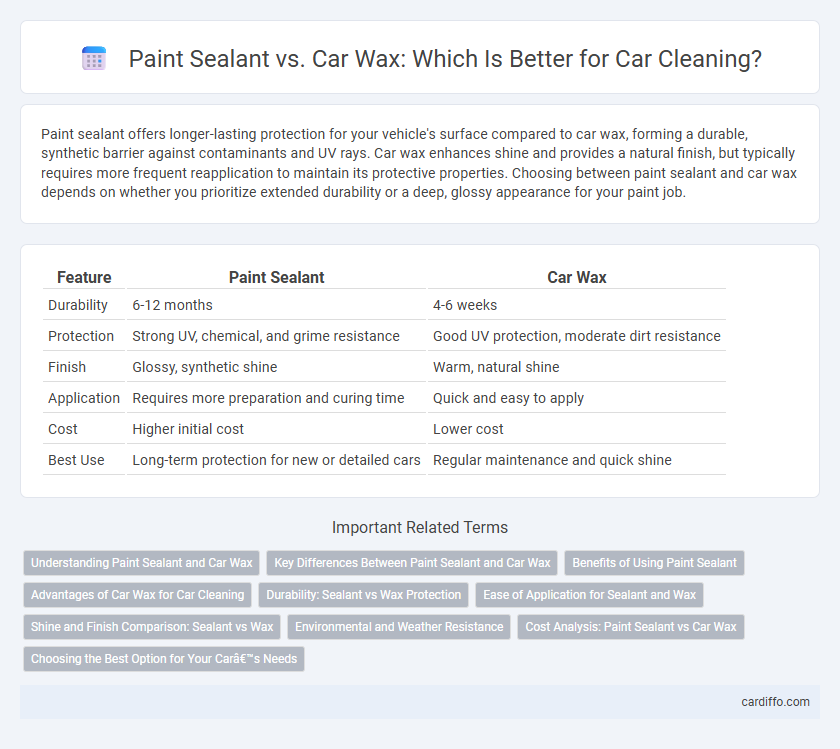Paint sealant offers longer-lasting protection for your vehicle's surface compared to car wax, forming a durable, synthetic barrier against contaminants and UV rays. Car wax enhances shine and provides a natural finish, but typically requires more frequent reapplication to maintain its protective properties. Choosing between paint sealant and car wax depends on whether you prioritize extended durability or a deep, glossy appearance for your paint job.
Table of Comparison
| Feature | Paint Sealant | Car Wax |
|---|---|---|
| Durability | 6-12 months | 4-6 weeks |
| Protection | Strong UV, chemical, and grime resistance | Good UV protection, moderate dirt resistance |
| Finish | Glossy, synthetic shine | Warm, natural shine |
| Application | Requires more preparation and curing time | Quick and easy to apply |
| Cost | Higher initial cost | Lower cost |
| Best Use | Long-term protection for new or detailed cars | Regular maintenance and quick shine |
Understanding Paint Sealant and Car Wax
Paint sealants create a durable, synthetic protective layer on a vehicle's surface, offering long-lasting resistance against environmental contaminants and UV rays. Car wax, derived from natural or synthetic ingredients, provides a glossy finish and enhances paint depth but typically requires more frequent application due to shorter durability. Understanding these differences helps determine the best choice for maintaining a car's exterior appearance and protection over time.
Key Differences Between Paint Sealant and Car Wax
Paint sealant offers longer-lasting protection than car wax, typically enduring for six months to a year, while car wax usually lasts up to three months. Sealants provide a synthetic, durable barrier against UV rays, oxidation, and contaminants, whereas car wax imparts a natural shine and smoother finish due to its organic compounds. The application process for paint sealant is more intensive but results in superior resistance to environmental damage compared to the easier, more frequent application of car wax.
Benefits of Using Paint Sealant
Paint sealant offers superior durability compared to traditional car wax, providing protection that can last up to six months or more. It forms a strong, chemical-resistant barrier against environmental contaminants, UV rays, and oxidation, maintaining the vehicle's glossy finish. Its synthetic formulation ensures a smooth application and enhances color depth, making it ideal for long-term vehicle care.
Advantages of Car Wax for Car Cleaning
Car wax provides a glossy finish that enhances the car's appearance by creating a deep, reflective shine. It offers excellent water beading properties, making it easier to clean dirt and grime off the surface. Additionally, car wax adds a protective layer that guards against UV rays, minor scratches, and contaminants, helping maintain the paint's longevity.
Durability: Sealant vs Wax Protection
Paint sealants offer superior durability compared to car wax, typically protecting the vehicle's surface for 4 to 6 months, while wax protection lasts around 4 to 6 weeks. Sealants form a strong, synthetic layer that resists environmental damage such as UV rays, acid rain, and road salts more effectively than natural waxes. This extended protection reduces the frequency of reapplications, making paint sealants a preferred choice for long-lasting vehicle care.
Ease of Application for Sealant and Wax
Paint sealant generally offers easier application due to its synthetic formulation that spreads smoothly and cures quickly, allowing for a more uniform protective layer with less effort. Car wax, often made from natural ingredients like carnauba, requires more precise buffing and frequent touch-ups to achieve a deep shine, making it slightly more labor-intensive. Sealants provide longer-lasting protection with fewer reapplications compared to wax, optimizing maintenance time and effort.
Shine and Finish Comparison: Sealant vs Wax
Paint sealants provide a longer-lasting, high-gloss shine compared to car wax, as their synthetic polymers form a durable protective layer. Car wax offers a rich, deep finish with a natural warmth but tends to fade faster under environmental exposure. For a consistent mirror-like finish and extended protection, paint sealants outperform wax in maintaining shine and surface clarity.
Environmental and Weather Resistance
Paint sealants offer superior environmental and weather resistance compared to traditional car wax, providing a durable barrier against UV rays, acid rain, and road salts. Their synthetic polymers form a long-lasting shield that prevents oxidation and fading, often lasting several months longer than natural waxes. Car wax, while biodegradable and eco-friendly, typically requires more frequent application due to its lower resistance to harsh weather and contaminants.
Cost Analysis: Paint Sealant vs Car Wax
Paint sealants typically cost more upfront, averaging between $30 and $70 per application, but they provide longer-lasting protection that can extend up to six months. Car wax is more affordable, generally priced around $10 to $30, but requires more frequent reapplication every 4 to 6 weeks. Analyzing cost per durability, paint sealants offer better value for long-term protection despite the higher initial investment, while car wax remains a budget-friendly option for regular surface shine and maintenance.
Choosing the Best Option for Your Car’s Needs
Paint sealant offers long-lasting protection by forming a durable barrier against UV rays, dirt, and contaminants, ideal for those seeking extended maintenance intervals. Car wax provides a warm, glossy finish with excellent water-beading properties, perfect for enhancing the car's appearance and offering moderate protection. Selecting the best option depends on your priorities between durability and shine, as well as the frequency of application and exposure to environmental elements.
Paint Sealant vs Car Wax Infographic

 cardiffo.com
cardiffo.com